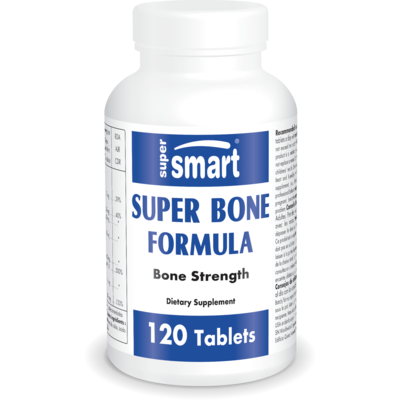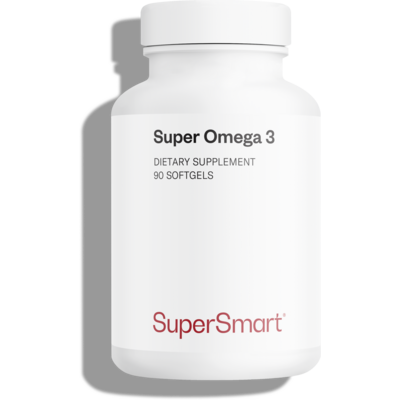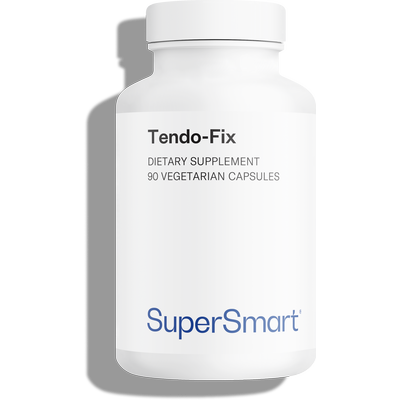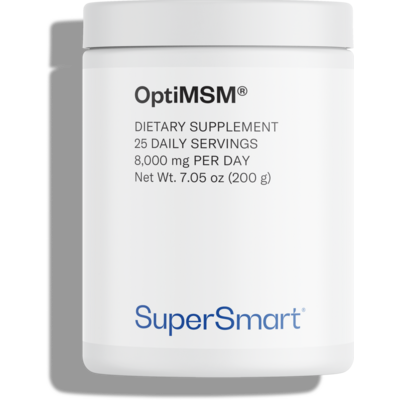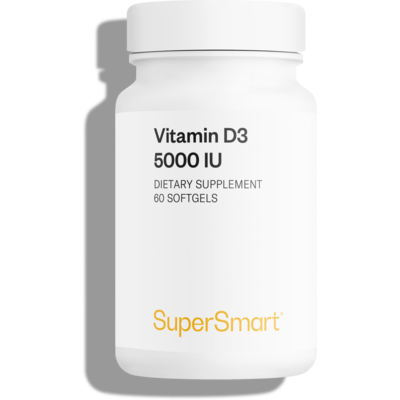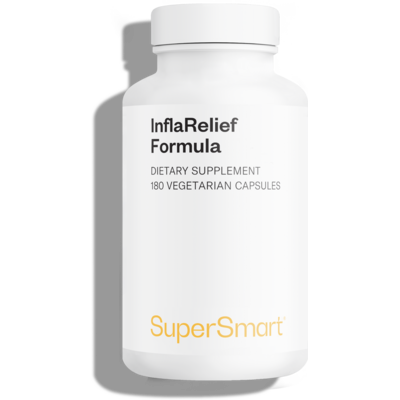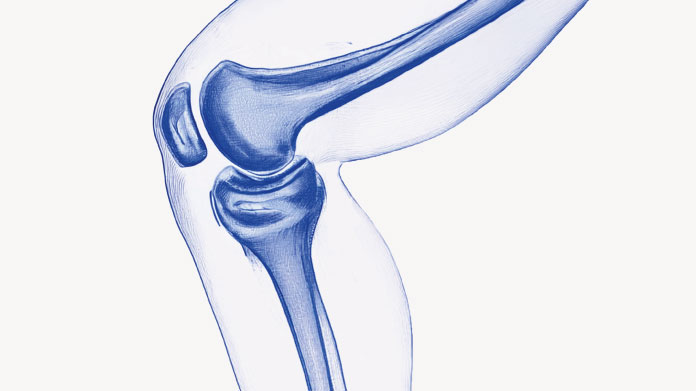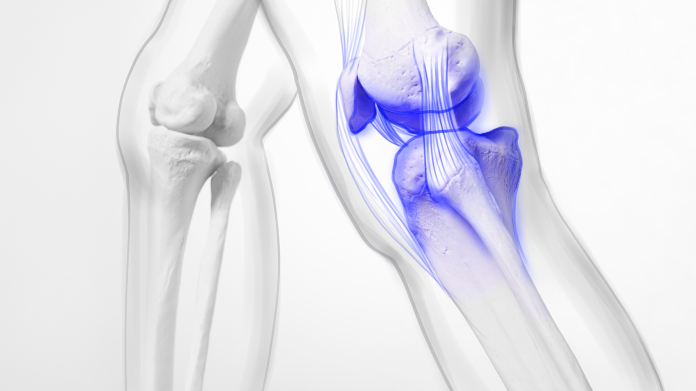What supplements should you take for rheumatism?
Painful, incapacitating, debilitating: rheumatism and other musculoskeletal disorders are thought to affect 18% of the world’s population. Which supplements are best when it comes to managing these conditions?

Reminder: what is rheumatism?
Definition of rheumatism
‘Rheumatism’ is an umbrella term for more than 200 distinct conditions. This generic medical term actually covers all diseases that affect connective tissue and the various elements of the musculoskeletal system (including the bones, joints, muscles, tendons and ligaments).
Two forms of rheumatism and their primary causes
There are two major types of rheumatism:
- inflammatory rheumatism (which includes arthritis, ankylosing spondylitis, rheumatoid arthritis and psoriatic arthritis);
- and non-inflammatory rheumatism (which includes osteoarthritis, gout, osteoporosis and chronic back pain) (1-3).
The first is usually related to an auto-immune disease and is more likely to affect younger people, while the second is often the result of simple wear and tear, repeated trauma or excessive stress on cartilage.
Symptoms of osteoarticular problems
Rheumatism typically manifests as joint or muscle pain, stiffness, swelling, or even deformity of the hands and feet which can significantly affect mobility, well-being and quality of life (4).
Rheumatism attacks: how to prevent and relieve them
Managing rheumatism involves both medical and non-medical approaches, in order to restrict potential inflammation, reduce the frequency of painful episodes and minimise loss of independence.
Adopting certain lifestyle measures, whether for prevention or relief, can have a positive effect on its development:
- lose weight if you need to to reduce stress on your joints (5);
- eat a balanced, predominantly plant-based, diet, high in antioxidants, reducing your consumption of fresh and processed meat and alcohol (acid-forming in excess) (6);
- stop smoking (7);
- maintain good oral hygiene, as inflammation of the gums (periodontitis) has been linked to certain rheumatic disorders (8);
- take appropriate exercise to maintain joint flexibility and prevent muscle and cartilage atrophy (9);
- use hot compresses to reduce stiffness and ice to soothe inflamed limbs (10);
- consider physiotherapy to reduce pain and learn how to correctly use any mobility aids (walking sticks, neck braces …), or even spa treatments (which can help in cases of osteoarthritis, auto-immune rheumatism and fibromyalgia) (11);
- as we’ll see, there are also dietary supplements that can help. Be sure to take advice from a health professional to tailor supplementation to your particular needs, depending on your condition.
The best supplements for rheumatism
Omega-3, the Inuit people’s secret to good mobility
Back in 1980, Danish scientists made a surprising discovery: the Inuit, the world’s largest consumers of EPA and DHA omega-3 fatty acids, seemed unusually unaffected by osteoarticular problems.
It has since been found that people suffering from inflammatory rheumatism have abnormally low levels of omega-3 in their cartilage, in contrast to too-high levels of pro-inflammatory omega-6 (12). In this context, supplementing with marine omega-3 (such as the product Super Omega 3, in which EPA and DHA are combined in a highly-stable formulation) can help restore the right ratio between these two types of essential fatty acid (13).
MSM, a sulphur-containing compound showing promise in rheumatism
When it comes to finding natural remedies for osteoarthritis rheumatism, MSM (methylsulfonylmethane) comes up again and again. Though its mechanisms of action are not yet fully understood, we know that this substance, which circulates naturally in the body, contains a large amount of sulphur – a mineral involved in the production of chondroitin, glucosamine and hyaluronic acid in cartilage (14). While small amounts are found in a number of foods, supplementing with MSM (for example with the product OptiMSM®, guaranteed free from contaminant residues) ensures an effective intake.
Collagen, the fundamental constituent of joints
Collagen is the most abundant structural protein in the body. This biological ‘glue’ is concentrated in the joints, bones, muscles, ligaments and tendons where it provides cohesion and elasticity (15). Production starts to decline from the age of 25 and continues to do so with age, which explains why the mechanics of our joints become prone to dysfunction.
To replenish our reserves, it’s a good idea to take a specific natural collagen supplement (like Tendo-Fix, based on an optimal balance between types I, II, V and X collagen which make up connective tissue, bones and cartilage) (16-17).
Rheumatism: ginger and turmeric, two natural anti-inflammatories
The herbal medicine arsenal contains two rhizomes known for their ability to delay inflammation: turmeric (Curcuma longa) and ginger (Zingiber officinale) (18). Their effects are thought to be due to curcumin and gingerol respectively, both of which have an inhibitory action on the COX-2 enzyme, the principal mediator of inflammatory pain (19).
They can be found combined in a single capsule in certain synergistic formulations (such as InflaRelief Formula, which also contains extracts of nettle and boswellia both of which support joint health) (20).
Vitamin D, for countering the loss of bone minerals
What about vitamins for boosting cartilage? While no vitamin is in itself able to relieve rheumatism, some act as essential intermediaries in strengthening musculoskeletal structures. One such example is vitamin D, which helps maintain normal muscle function and healthy bones. Together with calcium, it also helps to reduce bone mineral loss in menopausal women (low bone mineral density being a risk factor for osteoporotic fractures) (21).
Given that deficiency in this vitamin is extremely common in northern latitudes, especially during the winter months, it makes sense to have a blood test to check your vitamin D status and supplement if necessary (Vitamin D3 5000 IU offers a suitable dose for those who are deficient).
Bamboo tabashir, a valuable source of organic silica
Tabashir is a resinous exudate obtained from the stems of bamboo (Bambusa arundinacea), a woody plant that supports bone and joint health. With a remineralising effect, it is an exceptional source of silica which plays a structural role in connective tissue (22). It is particularly aimed at individuals who have suffered a loss of bone mass (the all-in-one supplement Super Bone Formula benefits from a highly-concentrated tabashir extract combined with zinc, calcium, vitamin D3…)
SuperSmart ADVICE
References
- Chauhan K, Jandu JS, Brent LH, et al. Rheumatoid Arthritis. [Updated 2023 May 25]. In: StatPearls [Internet]. Treasure Island (FL): StatPearls Publishing; 2024 Jan-. Available from: https://www.ncbi.nlm.nih.gov/books/NBK441999/
- Atkinson MH. Osteoarthrosis. Can Fam Physician. 1984 Jul;30:1503-7. PMID: 21278961; PMCID: PMC2153568.
- Porter JL, Varacallo M. Osteoporosis. [Updated 2023 Aug 4]. In: StatPearls [Internet]. Treasure Island (FL): StatPearls Publishing; 2024 Jan-. Available from: https://www.ncbi.nlm.nih.gov/books/NBK441901/
- Hardin JG. Rheumatic Pain. In: Walker HK, Hall WD, Hurst JW, editors. Clinical Methods: The History, Physical, and Laboratory Examinations. 3rd edition. Boston: Butterworths; 1990. Chapter 159. Available from: https://www.ncbi.nlm.nih.gov/books/NBK267/
- Kreps DJ, Halperin F, Desai SP, Zhang ZZ, Losina E, Olson AT, Karlson EW, Bermas BL, Sparks JA. Association of weight loss with improved disease activity in patients with rheumatoid arthritis: A retrospective analysis using electronic medical record data. Int J Clin Rheumtol. 2018;13(1):1-10. doi: 10.4172/1758-4272.1000154. PMID: 29606976; PMCID: PMC5875117.
- Chen W, Liu K, Huang L, Mao Y, Wen C, Ye D, He Z. Beef intake and risk of rheumatoid arthritis: Insights from a cross-sectional study and two-sample Mendelian randomization. Front Nutr. 2022 Sep 6;9:923472. doi: 10.3389/fnut.2022.923472. PMID: 36147307; PMCID: PMC9486088.
- Chang K, Yang SM, Kim SH, Han KH, Park SJ, Shin JI. Smoking and rheumatoid arthritis. Int J Mol Sci. 2014 Dec 3;15(12):22279-95. doi: 10.3390/ijms151222279. PMID: 25479074; PMCID: PMC4284707.
- Araújo VM, Melo IM, Lima V. Relationship between Periodontitis and Rheumatoid Arthritis: Review of the Literature. Mediators Inflamm. 2015;2015:259074. doi: 10.1155/2015/259074. Epub 2015 Aug 4. PMID: 26347200; PMCID: PMC4539505.
- org [Internet]. Cologne, Germany: Institute for Quality and Efficiency in Health Care (IQWiG); 2006-. Exercise and sports for rheumatoid arthritis. [Updated 2020 May 20]. Available from: https://www.ncbi.nlm.nih.gov/books/NBK384465/
- Welch V, Brosseau L, Casimiro L, Judd M, Shea B, Tugwell P, Wells GA. Thermotherapy for treating rheumatoid arthritis. Cochrane Database Syst Rev. 2002 Apr 22;2002(2):CD002826. doi: 10.1002/14651858.CD002826. PMCID: PMC6991938.
- Kavuncu V, Evcik D. Physiotherapy in rheumatoid arthritis. MedGenMed. 2004 May 17;6(2):3. PMID: 15266230; PMCID: PMC1395797.
- Sibille KT, King C, Garrett TJ, Glover TL, Zhang H, Chen H, Reddy D, Goodin BR, Sotolongo A, Petrov ME, Cruz-Almeida Y, Herbert M, Bartley EJ, Edberg JC, Staud R, Redden DT, Bradley LA, Fillingim RB. Omega-6: Omega-3 PUFA Ratio, Pain, Functioning, and Distress in Adults With Knee Pain. Clin J Pain. 2018 Feb;34(2):182-189. doi: 10.1097/AJP.0000000000000517. PMID: 28542024; PMCID: PMC5701880.
- Kostoglou-Athanassiou I, Athanassiou L, Athanassiou P. The Effect of Omega-3 Fatty Acids on Rheumatoid Arthritis. Mediterr J Rheumatol. 2020 Jun 30;31(2):190-194. doi: 10.31138/mjr.31.2.190. PMID: 32676556; PMCID: PMC7362115.
- Butawan M, Benjamin RL, Bloomer RJ. Methylsulfonylmethane: Applications and Safety of a Novel Dietary Supplement. 2017 Mar 16;9(3):290. doi: 10.3390/nu9030290. PMID: 28300758; PMCID: PMC5372953.
- Wu M, Cronin K, Crane JS. Biochemistry, Collagen Synthesis. [Updated 2023 Sep 4]. In: StatPearls [Internet]. Treasure Island (FL): StatPearls Publishing; 2024 Jan-. Available from: https://www.ncbi.nlm.nih.gov/books/NBK507709/
- García-Coronado JM, Martínez-Olvera L, Elizondo-Omaña RE, Acosta-Olivo CA, Vilchez-Cavazos F, Simental-Mendía LE, Simental-Mendía M. Effect of collagen supplementation on osteoarthritis symptoms: a meta-analysis of randomized placebo-controlled trials. Int Orthop. 2019 Mar;43(3):531-538. doi: 10.1007/s00264-018-4211-5. Epub 2018 Oct 27. PMID: 30368550.
- Barnett ML, Kremer JM, St Clair EW, Clegg DO, Furst D, Weisman M, Fletcher MJ, Chasan-Taber S, Finger E, Morales A, Le CH, Trentham DE. Treatment of rheumatoid arthritis with oral type II collagen. Results of a multicenter, double-blind, placebo-controlled trial. Arthritis Rheum. 1998 Feb;41(2):290-7. doi: 10.1002/1529-0131(199802)41:2<290::AID-ART13>3.0.CO;2-R. Erratum in: Arthritis Rheum 1998 May;41(5):938. PMID: 9485087.
- Zhou X, Afzal S, Wohlmuth H, Münch G, Leach D, Low M, Li CG. Synergistic Anti-Inflammatory Activity of Ginger and Turmeric Extracts in Inhibiting Lipopolysaccharide and Interferon-γ-Induced Proinflammatory Mediators. 2022 Jun 16;27(12):3877. doi: 10.3390/molecules27123877. PMID: 35745000; PMCID: PMC9229778.
- Lantz RC, Chen GJ, Sarihan M, Sólyom AM, Jolad SD, Timmermann BN. The effect of extracts from ginger rhizome on inflammatory mediator production. 2007 Feb;14(2-3):123-8. doi: 10.1016/j.phymed.2006.03.003. Epub 2006 May 18. PMID: 16709450.
- Yu G, Xiang W, Zhang T, Zeng L, Yang K, Li J. Effectiveness of Boswellia and Boswellia extract for osteoarthritis patients: a systematic review and meta-analysis. BMC Complement Med Ther. 2020 Jul 17;20(1):225. doi: 10.1186/s12906-020-02985-6. PMID: 32680575; PMCID: PMC7368679.
- Lips P, van Schoor NM. The effect of vitamin D on bone and osteoporosis. Best Pract Res Clin Endocrinol Metab. 2011 Aug;25(4):585-91. doi: 10.1016/j.beem.2011.05.002. PMID: 21872800.
- Martin KR. The chemistry of silica and its potential health benefits. J Nutr Health Aging. 2007 Mar-Apr;11(2):94-7. PMID: 17435951.
Keywords
5 Days
great products and prices
great products and prices
Marie
11 Days
Easy to navigate site
Easy to navigate site, had what I was searching for, good price. easy order-check out
James Tucker
17 Days
My skin is clearing up nicely!
Pretty good for my skin so far.
Christian
19 Days
The new packaging is excellent
The new packaging is excellent - finally! No more squashed boxes and torn envelopes.
GORAN
20 Days
Great Product
Great Product
Larry Garrett
24 Days
Quick shipping
Quick shipping; good price. No issues!
Mary McCarty
26 Days
Thr product is very good and is helping…
Thr product is very good and is helping me on my health. Then is always on time
LUGO Luz
28 Days
Buying was fine
Buying was fine. I had problems with the website not recognizing my login info, and had to call to get it fixed. Other than that, everything was good.
David S. Clark
29 Days
Your super maca and super ginseng are…phenomenal
Your super maca and super ginseng are phenomenal supplements that compliment each other when taking them together. Fantastic feeling of well-being and lots of mid day energy without the crash.
Keith Mason
31 Days
I have had amazing results with every…
I have had amazing results with every supplement I've purchased. I am extremely satisfied with this company
kirstin Torres
31 Days
Fine products
Fine products . They are on the leading edge of online supplements. The only issue -so far-is they sometime run out of subscription items.
Jason Argos
34 Days
The ordering process is very user…
The ordering process is very user friendly and the products always come in a timely manner.
CARTER Rhonda
35 Days
The price for Dr
The price for Dr. Pero's AC-11 is reasonable and in line with his views. (my former colleague). Keep it pure.
CAMPBELL Clayton
38 Days
Right on every time.
Right on every time.
Arthur Nicholas
41 Days
They are cheaper than everyone else and…
They are cheaper than everyone else and the shipping was fast. Great company.
Patricia Adams


